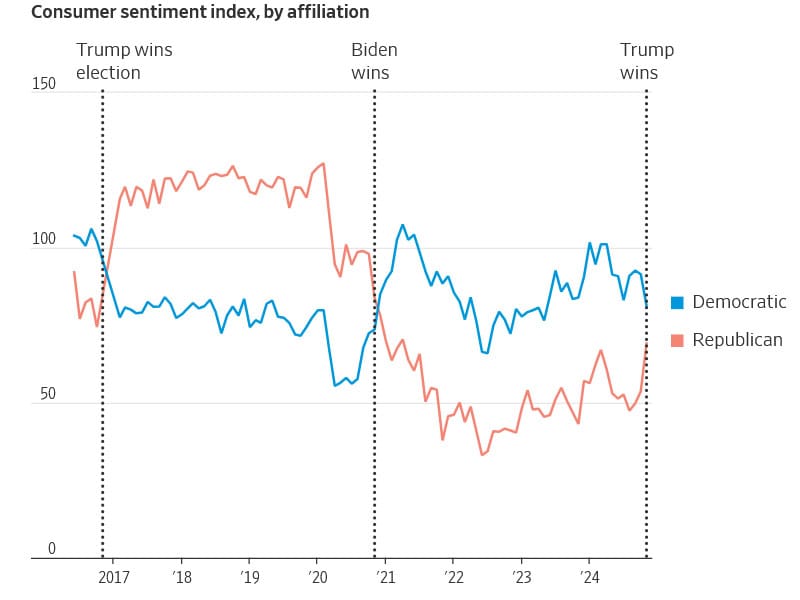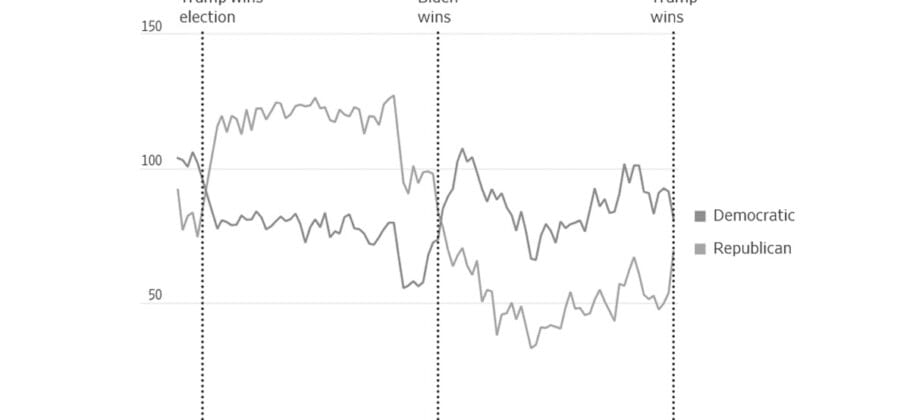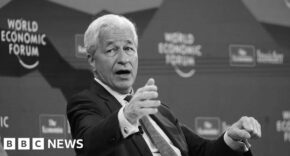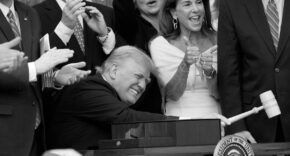Republicans are riding high on optimism following Donald Trump’s victory in the 2024 presidential election, while Democrats are experiencing a starkly different emotional shift. According to Harriet Torry of The Wall Street Journal, recent findings from the University of Michigan’s consumer sentiment survey reveal how partisan perspectives have driven dramatic swings in economic outlook.
In November, consumer sentiment among Republican households skyrocketed by over 15 points, reflecting their renewed confidence in the nation’s economic trajectory. Conversely, sentiment among Democratic households plummeted by more than 10 points. The net result of these opposing movements nudged the overall index higher to 71.8, up from 70.5 in October. While Democrats still report higher overall optimism (81.3 compared to Republicans’ 69.1), the election’s impact on expectations has deepened the partisan divide.

The Partisan Effect on Expectations
The expectations index, which gauges optimism about the future, demonstrated even more striking shifts. Republicans’ expectations surged by 28 points, while Democrats’ outlooks dropped by nearly 18 points. Economists attribute these swings not to immediate changes in the economy but to the psychological influence of political affiliation on perceptions.
Michael Zdinak of S&P Global explained, “It’s very much people justifying their economic reality based on their perceptions.” This alignment of sentiment with partisan identity underscores how elections can reshape public attitudes without materially affecting economic fundamentals.
The Broader Economic Context
Despite the partisan swings, the survey showed smaller changes in perceptions of current economic conditions. As Joanne Hsu, the survey’s director, noted, this reflects that “the resolution of the election exerted little immediate impact on the current state of the economy.”
Positive economic indicators—such as easing inflation, a strong labor market, and the Federal Reserve’s rate cuts—contribute to a generally favorable environment. These factors may explain why consumer spending has remained steady even amid sentiment fluctuations.
Hector Sandoval, an economist at the University of Florida, pointed out that consumer sentiment often correlates with spending on discretionary items like vacations or luxury goods. His research found increased spending in Republican-leaning counties following Trump’s 2016 win, suggesting that optimism can translate into economic activity.
Inflation Worries Linger
However, not all sentiment indicators point toward unbridled confidence. The survey revealed that consumers expect inflation to rise over the next five years, with the anticipated rate increasing to 3.2%, the highest in a year. This aligns with warnings from economists who caution that Trump’s proposed policies—such as tariffs and stricter immigration measures—could fuel inflationary pressures.
A Historical Pattern
Partisan sentiment shifts following elections are not new. Research from economists Ryan Cummings and Neale Mahoney, both of whom served in the Biden administration, shows that Republicans tend to experience more pronounced emotional swings than Democrats. Their analysis found that Republicans’ sentiment improves 2.5 times more dramatically when their party gains power and declines more steeply when it loses.
The Pew Research Center’s latest findings echo these trends. The share of Republicans expressing positive views about the country’s direction jumped from 10% in October to 35% after the election. Meanwhile, Democrats’ optimism dropped from 38% to 24%.
The Economic and Psychological Interplay
While consumer sentiment often serves as a bellwether for economic activity, it is not always predictive. Atif Mian of Princeton University cautioned that improved sentiment doesn’t necessarily translate into immediate spending increases. “If I feel good that my government is going to be run more efficiently, it doesn’t really change my day-to-day spending patterns,” Mian said, emphasizing that economic fundamentals like productivity and borrowing costs ultimately drive financial behavior.
Still, the emotional boost among Republicans, coupled with a favorable economic backdrop, could provide a modest tailwind for consumer spending in the months ahead.
Donald Trump’s election has amplified partisan divides in consumer sentiment, with Republicans buoyed by optimism and Democrats grappling with uncertainty. While these shifts reflect perceptions more than reality, they highlight the intricate interplay between politics, psychology, and economics.
IAM Editor: Trump has caused this boost but he must follow through to sustain it. We saw a great economy in his first term, the expectations are high.











